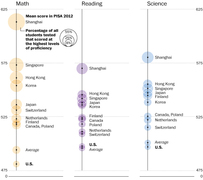
Each day had a general theme and my favorite was the day we focused on our own stories; each one of us had a chance to answer a few questions posited by a facilitator about what our personal mission statement would be if we had to choose one and how we would go about using our history to convey a message to motivate another to action.
One thing that came to mind during this exercise was the how often I think about my Jewish roots and values in my professional life. As many of my peers know, I am motivated to educate in public schools because of a quote from the Talmud that states the following:
- Whoever destroys a soul, it is considered as if he destroyed an entire world. And whoever saves a life, it is considered as if he saved an entire world. - Babylonian Talmud, Tractate Sanhedrin 37a.
Yesterday, Mayor-elect De Blasio chose the new Chancellor for New York City Schools, Carmen Fariña. As a new resident of the city, it is difficult for me to understand who this woman is or what she has done unless I am able to learn part of her story. Luckily, my current principal worked under her when Carmen was the regional superintendent for District 15 in Brooklyn (where I now work) and has given us her seal of approval. With just that much, I think I see a very different future for the Department of Education than the Joel Klein/Mayor Bloomberg years. I look forward to learning more and getting more involved.





 RSS Feed
RSS Feed
